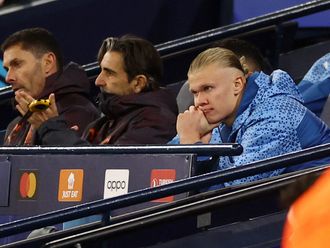London: Wirral angler Jamie is the Messi of the waterways, reads a recent headline from the Liverpool Echo. Multiple world champion Alex Marshall is known as the “Messi of bowls”.
Meanwhile, Charlotte Dujardin’s dressage mount Valegro has been dubbed “the Lionel Messi of horses”, which is cleverer than it sounds, as horses also lack the most basic understanding of tax law. Describing Steph Curry as “the Messi of basketball”, then, is both unforgivably lazy and strangely appropriate.
Curry makes the comparison himself: he reckons both are feel players, flair players, players who dare to surprise. Yet there are more than cosmetic similarities between the greatest footballer alive and the Golden State Warriors point guard breaking all sorts of records in the NBA. Curry sinks three-pointers like other players sink free throws.
His miraculous 38-foot last-second match-winning shot against Oklahoma City this season was the latest in a string of outrageous efforts single-handedly redrawing the geometry of basketball.
Last Tuesday, Curry accomplished something the former greats never did: He became the first unanimous NBA MVP, earning the award for the second straight season after leading the defending champion Warriors to a record-setting season.
“I never really set out to change the game. I never thought that would happen in my career,” Curry said in a press conference. “What I wanted to do was just be myself. ... I know it inspires a lot of the next generation, a lot of people who love the game of basketball to value the skill of it, value the fact that you can work every single day to get better. You’ve got to be able to put the time and the work. That’s how I got here, that’s how I continue to get better every single day.”
Curry is the 11th player in league history to be voted MVP in consecutive seasons and the first guard since Steve Nash in 2004-05 and 2005-06. Curry received 1,310 points from the 130 media voters from the US and Canada.
“I couldn’t imagine anybody not voting him first, and yet there always seems to be somebody who has to stand out,” Coach of the Year Steve Kerr said.
Just as Messi has redefined the possible in terms of scoring, Curry opens up areas of the court previously thought safe for defences. There was a time when the origin stories of great athletes was not too dissimilar to those of the people who paid to watch them.
Dixie Dean used to join Everton fans in the pub after games. Tom Finney worked as a plumber during the week. They were geniuses, but they were our geniuses. And in many sports, that umbilical link remains between the athlete, and the culture that created them.
But in some arenas, elite sportsmen and women are not so much drawn from society as siphoned out of it as early as possible. Footballers like Messi are funnelled into the academy system at prepubescence and cultivated like orchids. Your average Test rugby player has probably been drinking whey protein since the age of 13.
What Roger Federer and Novak Djokovic do is genius, but an ungraspable, unintelligible genius. The gulf between “them” and us is wider than it has ever been. Socially, the biggest stars barely intersect with real life at all, drifting through gilded wormholes between gated estates, first-class lounges and cordoned-off VIP areas filled with other millionaire athletes.
Physically, they may as well be a different species. And this has ramifications: whereas we once watched athletes to see something of ourselves, now the relationship is more akin to that of a deity with its subjects. In sport, as in music and politics, fandom is turning sharply away from the aspirational, towards the devotional.
Mass appeal
Curry, on one hand, would appear to follow this model to the letter. The son of a former player, he was earmarked for greatness from birth: a childhood spent in locker rooms, a youth spent burning up the college game. But there is a disarmingly human quality to him too. He is 6 feet 3 inches and barely 82 kg; not especially quick or strong; polite and essentially normal.
“I probably relate more to the casual fan,” he once said. “Not super-athletic, not this crazy monster of physical stature.”
Therein lies his appeal. A human in a world of superhumans: we will never be able to emulate Steph Curry, but somehow, his normality makes us believe we could. Perhaps it is true that “a convincing impossibility is preferable to an unconvincing possibility”, as Aristotle once said: or, to give his proper title, the Lionel Messi of Greek philosophy.
— The Telegraph Group Limited, London 2016











